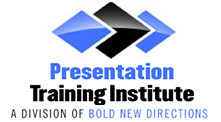Most people don’t get excited about the idea of presenting in front of a group. Rather, public speaking generally induces great fear and anxiety. Beginning public speakers often struggle with the psychological effects associated with giving a presentation. They worry about messing up, not remembering what to say, and looking nervous in front of the audience. As a result, they engage in an inner dialogue of negative self-talk. They say to themselves, “I’m not smart enough to speak in front of this audience,†“I can’t do this,†“I’m going to mess up and embarrass myself.†This inner critic is actually doing a tremendous amount of harm and can greatly impact your presentation. Here are a few of the ways negative self-talk can ruin your presentation.
It Can Intensify Stress
People who engage in negative self-talk tend to be more stressed. This is due in part to the fact that their reality is skewed in a way that makes it difficult for them to reach their goals. Giving a presentation will naturally cause some stress, but telling yourself you are going to fail only intensifies this stress and wreaks havoc on your nerves.
You Believe What You Say
The worst thing about negative self-talk is that the more you tell yourself something, the more you begin to believe it. You begin to embody what you are saying and you buy into the idea that these things are true. Even if you have worked hard to prepare a fabulous presentation, you can ruin the whole thing by convincing yourself of failure.
You Become Obsessed with Perfection
While it’s certainly important to strive for success, the reality is that perfection is simply not attainable. Negative self-talk leaves you striving for perfection with the expectation that you are going to fall short. It is much better to strive for your best rather than for perfection. Instead of telling yourself, “This won’t be perfect,†tell yourself, “ This will be my best.â€
You Lose Credibility
How can you expect others to believe in you when you don’t believe in yourself? Believe it or not, your audience will be able to tell if you lack confidence and this will cause you to lose credibility. Credibility is extremely important for speakers, so don’t give others a reason to doubt you by doubting yourself.
Self-Talk Drives Behavior
We use self-talk as a way to motivate and evaluate ourselves and it can direct our behavior to produce very real world outcomes. When you use negative self-talk, those ideas can become so ingrained in yourself that feel incapable of changing them. This can cause you to act the way you think. In other words, if you believe your presentation is going to be a failure, you might actually mess up when you present. Instead, use positive self-talk to drive your behavior toward success.
